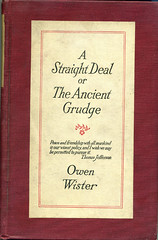CONCERNING ONE'S LETTER BOX
Publish any sort of conviction related to these morose days through which we are living, and letters will shower upon you like leaves in October. No matter what your conviction be, it will shake both yeas and nays loose from various minds where they were hanging ready to fall. Never was a time when so many brains rustled with hates and panaceas that would sail wide into the air at the lightest jar. Try it and see. Say that you believe in God, or do not; say that Democracy is the key to the millennium, or the survival of the unfittest... say what you please, and the yeas and nays will pelt you. So insecurely do the plainest, oldest truths dangle in a mob of disheveled brains, that it is likely, did you assert twice two continues to equal four and we had best stick to the multiplication table, anonymous letters would come to you full of passionate abuse. Thinking comes hard to all of us. To some it never comes at all, because their heads lack the machinery. How many of such are among us, and how can we find them out before they do us harm? Science has a test for this. It has been applied to the army recruit, but to the civilian voter not yet. The voting moron still runs amuck in our Democracy. Our native American air is infected with alien breath. It is so thick with opinions that the light is obscured. Will the sane ones eventually prevail and heal the sick atmosphere? We must assume so. Else, how could we go on?
That is the opening chapter of a book Owen Wister (author of The Virginian) published in 1920.

The text considers our old animosity, left over from our Revolutionary War, toward Great Britain, and I think much of what he wrote, here, was more than a little ahead of its time. Wister went on, in chapter II, to say this:
During the winter of 1915 I came to think that Germany had gone dangerously but methodically mad, and that the European War vitally concerned ourselves. This conviction I put in a book. Yeas and nays pelted me. Time seems to show the yeas had it.
During May, 1918, I thought we had made a mistake to hate England. I said so at the earliest opportunity. Again came the yeas and nays. You shall see some of these. They are of help. Time has not settled this question. It is as alive as ever -- more alive than ever. What if Germany absorb Russia and join Japan? What if the League of Nations break like a toy?
I wonder what Mr. Wister would think of where we are, today? The names and places have changed slightly, but the rest seems to go along just the same, 86 years later.
No comments:
Post a Comment